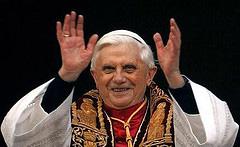COGaIC’s David Hulme on Pope Benedict XVI’s Book

Pope Benedict XVI
COGaIC’s David Hulme wrote the following for its Vision magazine:
In his recent book, Jesus of Nazareth, Pope Benedict XVI sets out to distill the understanding he has come to after a lifelong theological study of Christianity’s central figure. Stressing that he writes in his own name as Joseph Ratzinger, he leaves the door open for the Roman curia to distance itself from any alternative views he may advance. He writes, “This book is . . . my personal search ‘for the face of the Lord.’”
What, then, does the pope see as Jesus’ primary purpose in speaking about the kingdom of God, which was so central to His message? He writes that Jesus “is quite simply proclaiming God, and proclaiming him to be the living God, who is able to act concretely in the world and in history and is even now so acting. He is telling us: ‘God exists’ and ‘God really is God,’ which means that he holds in his hands the threads of the world.”
It is a strange definition of the gospel message, which Jesus said pertained to God’s kingdom coming to the earth. Yet Ratzinger insists, “What is meant is not an imminent or yet to be established ‘kingdom,’ but God’s actual sovereignty over the world, which is becoming an event in history in a new way.” Such language takes us away from any anticipation of God’s rule over fractious humanity and away from the consistent message of the Bible.
When asked by Peter what reward the 12 disciples might expect for their loyalty, Jesus pointed to the time of future messianic renewal. He said, “Truly, I say to you, in the new world, when the Son of Man will sit on his glorious throne, you who have followed me will also sit on twelve thrones, judging the twelve tribes of Israel” (Matthew 19:28, English Standard Version). The term “new world” is translated from the Greek palingenesia, which literally means “rebirth,” “renewal” or “regeneration.” This future aspect of the kingdom, mentioned by Jesus and recognized by leading language scholars, is the major dimension that the pope misses.
I would add that while a cardinal, the current Pope Benedict XVI also wrote and/or approved the following two statements:
676The Antichrist’s deception already begins to take shape in the world every time the claim is made to realize within history that messianic hope which can only be realized beyond history through the eschatological judgment. The Church has rejected even modified forms of this falsification of the kingdom to come under the name of millenarianism… (Catechism of the Catholic Church. Imprimatur Potest +Joseph Cardinal Ratzinger. Doubleday, NY 1995, p. 194).
“…both Chiliasm [the teaching of the Millennium] and Montanism were declared heretical and were excluded from the universal church; for they both denied this vision [the “Christ is the end of the ages” vision] and awaited still another period of more definitive salvation to follow after the age of Christ” (Ratzinger J. The Theology of History in St. Bonaventure as cited in Birch, pp. 515-516; note the comments within [] were from the Catholic writer Birch).
Sadly, the writings of the head of the Roman Church demonstrates that he does not understand Christ’s message. Even more sadly, there are many, many doctrines that the Church of Rome has changed.
Articles of related interest may include:
The Gospel of the Kingdom of God was the Emphasis of Jesus and the Early Church Did you know that? Do you even know what the gospel of the kingdom is all about. True religion should be based upon the true gospel.
Did The Early Church Teach Millenarianism and a 6000 Year Plan? Was a 6,000 year time allowed for humans to rule followed by a literal thousand year reign of Christ on Earth (often called the millennium) taught by the early Christians? Is this time near?
Which Is Faithful: The Roman Catholic Church or the Living Church of God? Do you know that both groups shared a lot of the earliest teachings? Do you know which church changed? Do you know which group is most faithful to the teachings of the apostolic church? Which group best represents true Christianity? This documented article answers those questions.
The History of Early Christianity Are you aware that what most people believe is not what truly happened to the true Christian church? Do you know where the early church was based? Do you know what were the doctrines of the early church? Is your faith really based upon the truth or compromise?
 |
Tweet |
|